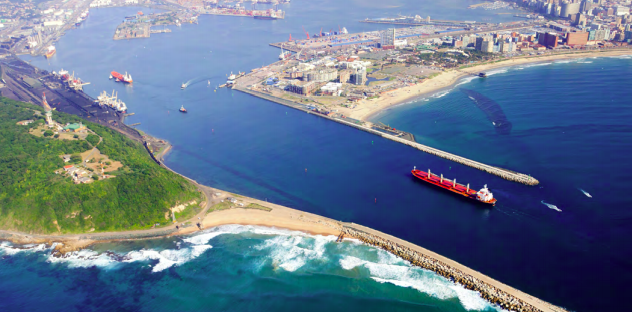South Africa’s location, economic development and vast renewable energy sources make it well suited to act as a zero-carbon fuels hub for shipping, a new study found.
The study by Ricardo and Environmental Defense Fund for the P4G Getting to Zero Coalition Partnership, exploring the economic and environmental potential for the implementation of zero-carbon shipping fuels through South African shipping sector, finds that the country holds an untapped opportunity to supply the global shipping industry with zero-carbon fuels, while meeting its decarbonization targets and creating the jobs of the future.
[smlsubform prepend=”GET THE SAFETY4SEA IN YOUR INBOX!” showname=false emailtxt=”” emailholder=”Enter your email address” showsubmit=true submittxt=”Submit” jsthanks=false thankyou=”Thank you for subscribing to our mailing list”]
Among others, South Africa is situated on one of the busiest international sea routes, a passing point between Asia and South America and Europe; boasting strong trade links with China, Germany, US, UK and India. As the second largest economy in Africa, South Africa is rich in natural resources, precious stones, metals, and minerals; with mining, manufacturing, textiles and chemicals as major industries.
The adoption of zero-carbon propulsion technologies at South Africa’s ports could attract investment of between 122 and 175 billion Rand in onshore infrastructure by 2030. All that is needed to unlock this investment is the right policy incentives set at the IMO,
…says Aoife O’Leary, Director, International Climate, Environmental Defense Fund.
The report finds that several zero-carbon fuels can potentially be used in shipping. The abundance of renewable energy resource in South Africa means that shipping fuels can be derived from renewable electricity generation. The report identifies hydrogen and ammonia as the most suitable options for large commercial vessels while South Africa’s small domestic vessels can be supplied through direct electrification using onboard batteries and motors, explains Ingrid Sidenvall Jegou, Project Director, Global Maritime Forum.
 However, the adoption of zero-carbon shipping fuels depends on global market requirements. For a successful adoption of zero-carbon shipping fuels, South Africa should look globally. Vessels adopting zero-carbon fuels bunkering in various ports around the world must have the opportunity to refuel along their journey.
However, the adoption of zero-carbon shipping fuels depends on global market requirements. For a successful adoption of zero-carbon shipping fuels, South Africa should look globally. Vessels adopting zero-carbon fuels bunkering in various ports around the world must have the opportunity to refuel along their journey.
As such, there must be standards set by the maritime industry to encourage the zero carbon transition not only for vessels but for global ports. South Africa can be a part of driving these international standards as an important part of the international shipping sector and as a pioneer in zero-carbon fuels, the report notes.
Adopting zero-carbon shipping fuels has significant benefits and synergies for South Africa far beyond the shipping sector and is complimentary to South Africa’s ambitions to reach net zero carbon emissions by 2050. Zero carbon fuels may also be used in wider industries such as fertilizer and steel production and could act as a catalyst to achieving South Africa’s overall carbon commitments.
The report highlights the ports of Saldanha Bay, Ngqura (Coega) and Richards Bay as great examples of how South African can capitalize on a zero-carbon fuel transition due to established shipping routes and significant port export hubs.
It is easy to make a generalization that many developing countries are positioned to gain from a future hydrogen economy and hydrogen derived fuel use in shipping. This report goes into the important specifics of that opportunity for South Africa and finds not just why this is necessary, but the numerous reasons to be optimistic and seek to accelerate progress towards this future,
…says Tristan Smith, Reader in Energy and Shipping, University College London.




























































